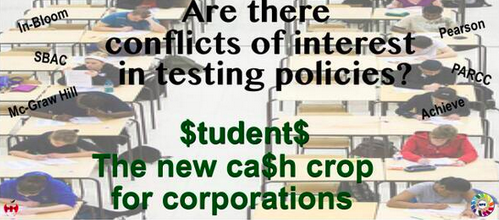A few days ago I wrote about what I loved about the Common Core State Standards (CCSS). You can read that post here. I mentioned that I would follow up with what I see as the downfalls at a later time. I'll have you know, I've been in revision with this post for a few days now. But, I suppose it's time to share.
The thing is, I'm not the kind of person who wants to complain about things and be all negative. Rather, I offer this to you all in the form of a few worries I have. Actually, I kinda went a little off-topic as I found my concerns with the CCSS mostly in the testing aspect of it. Are you ready for a discussion about this? Here are three of my worries about the state of public education in our day and time.
I worry that the CCSS make some teachers compromise what kind of teacher they are or want to be. Like the teacher who wrote this letter.
I used to (solely) look to standardized tests and data from them to inform everything I did. In grad school, I learned lots of other ways to collect information about students that could be used to inform my instruction - student interest surveys, running records and comprehension conversations, written responses to content and writing rubrics and portfolios. As an educational professional, I don't think standardized testing data should be the only source of information that means anything to us as educators, but unfortunately, Obama and Arne Duncan believe otherwise. (Hear from a principal who feels the same here.)
I feel like they have set into motion a crisis mentality about our education system. They want to tell you things like, "We're in trouble! We are failing our students! Our schools need to be closed down!" The thing is, we are not in trouble. The trouble our public schools face is poverty. Take a look at this video:
My worry? I fear that teachers are looking to the government who wrote the standards and being upset by this crisis mentality that we're not doing a good job. Turns out, we are doing a good job and we have been. We are professionals who know what good teaching is all about!
I worry that teachers and schools are unfairly labeled and ranked because of the testing situation in our country.
I do not think that teachers should be evaluated by test scores - it's not fair! To the gifted teacher who has students at the ceiling on their standardized test scores - they should not be evaluated poorly because their students didn't grow. To the teacher who teaches students with special needs or students who are English Language Learners - how is it fair to evaluate those teachers based on the tests scores of their students?
As I mentioned in my other post, I agree we do need to have forms of accountability, but standardized test scores are just one form. I have a big problem with labeling students, teachers, and schools based on their scores. I think this is driving lots of teachers out of the profession and deterring new teachers from coming in.
I worry that companies and billionaires want to profit from public education - that they see it as an "industry" to make money.
Have you thought about all the companies who make money in our field of work? I think at the IRC Conference one presenter referred to Pearson as the "PacMan" of the educational supplies - gobbling up any and all opportunities to create and score tests, provide textbooks that are aligned to the CCSS, and create book after book of mindless worksheets to test prep our students. I don't think companies should be making all this money off public education! It's really become just too much.
And in addition to that - PARCC and the other testing consortium are being paid millions to create the tests online that will measure student success with the CCSS. Look at all the people and companies making millions on testing our kids!
Honestly, I believe the best curriculum comes from educators. When I moved to Illinois, before I even met the team of teachers I worked with, I printed out the Illinois state standards and mapped them out with a calendar and a pencil. I figured out what made sense to teach when and in what order, so skills would build on one another. I created a year-long vision of what I was hoping to accomplish before I even walked through the front doors of my new school.
Then, I went to my resources and figured out what I had that would work with what I wanted to teach. I found my favorite novels and short stories that would model different strategies and I determined how I would have my readers and writers set up their notebooks for purposeful learning.
I then thought about my assessments. How would I know if and when student mastered my content?
But it's not just all that - I had to meet my kids and align my plans to their specific needs. While it's important to have an overview in your head, you also have to understand that you need to meet your students where they are. Yetta Goodman reminds us of this in this introduction she wrote in one of her books:
I am the teacher who is committed to discovering what each of my students knows, cares about, and can do.
I am the teacher who wants to understand each of my student’s ways of constructing and experiencing knowledge.
I am the teacher who helps my students connect what they are learning to what they already know.
I am the teacher who respects the language and culture my students learn at home, and who supports the expansion of this knowledge at school.
I am the teacher who knows that there are multiple paths to literacy, and who teaches along each child’s path.
I am the teacher who is committed to social justice and to understanding literacy as a sociocultural practice.
I am the teacher who believes that each child can teach me about teaching, language, and learning
I am the teacher who believes in the interconnectedness of language, learning, and life.
I am the teacher who supports children in writing I can! on their wings.
I am a kidwatcher.
My worry? That teachers look to basal readers and Pearson to inform their instruction. I'd hope they would look to their students, their standards, and their professional knowledge instead.
Anyways....
So there's just a few things. I understand that no system will ever be perfect. Luckily, this is not the kind of thing that is going to burn me out of education. I love the kids I get to see smiling up at me each day I walk through the halls of our school!
If you want to read more, I invite you to get a copy of this book:
I just ordered it on amazon this morning, so looking forward to having another book in my cue!
Well, this is a little heavy for Sunday morning, right? Perhaps you should go grab your Divergent series and some pancakes now!
Or, if you feel inclined to share, I'd love to hear your thoughts on the topic!
Thanks for listening!
PS - A really snarky/funny take on CCSS here.





























MIchelle....you've done a really nice job of balancing both sides of this CC mess, all the while keeping the true "sanctity" of education at the core. Beautifully written, and inspiring (LOVED the video!)... I couldn't agree with you more on this post!! And since I AM from Indiana, I'll have to comment on your first post! :-) I was truly glad to see our leaders decide to write our own standards, which we are currently doing (we are in revision stage after getting public input). The educators given the task have chosen a pretty good balance of CC standards, as well as previous IN standards that they think are important to have. I, too, think CC has many positive elements, especially in language arts; however, my biggest concern (which I did voice during the online public review period!), is just making sure the standards chosen are developmentally appropriate (and most of my biggest concerns are with math...). We'll see what ends up happening in the next few months! Thanks for being a true teacher champion!!
ReplyDeleteMichelle,
ReplyDeleteLike you, most of my concerns about CCSS are not at all about the standards, but they are, instead, about all of the testing that we are being required to do. And I worry about those of us who teach in high poverty, urban areas, where we are told on a daily basis that nothing we do is good enough. It's spirit draining and exhausting! I love the Yetta Goodman quote. Thanks for sharing that with us today!
I also teach in Illinois. I love what you have said with both the pros and cons of the CCSS. I loved your quote about being a "kid watcher." Thank you for sharing these 2 great posts!
ReplyDeleteApart from these, he can additionally handle any type of software application video game localization solutions you wished to use for your internet site. Like as an example including software application to the site which will certainly have the ability to fit different source data alike XML, RC, or java, and also binary data like as well as dull.
ReplyDelete